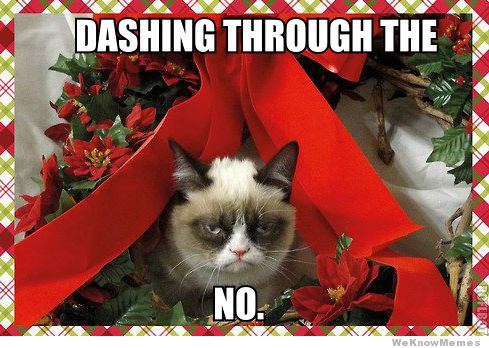All Calories Are Not Created Equally

AdieEve
Posts: 87 Member
This article does a good job of summing up why:
http://m.runnersworld.com/the-starting-line/calorie-count-not-all-calories-are-created-equal?adbid=10152456923031987&adbpl=fb&adbpr=9815486986&cid=socHE_20141207_36739247
http://m.runnersworld.com/the-starting-line/calorie-count-not-all-calories-are-created-equal?adbid=10152456923031987&adbpl=fb&adbpr=9815486986&cid=socHE_20141207_36739247
-1
Replies
-
TL;DR - Sugar is the devil.This article does a good job of summing up why:
http://m.runnersworld.com/the-starting-line/calorie-count-not-all-calories-are-created-equal?adbid=10152456923031987&adbpl=fb&adbpr=9815486986&cid=socHE_20141207_367392470 -
An inch does not equal an inch? A calorie is a measure. As far as weight loss, a calorie IS a calorie. If you talk about health, it is a different story0
-
This content has been removed.
-
When people say "a calorie is a calorie" they mean that you will gain weight if you take in more calories than you burn and lose weight if you take in fewer calories than you burn. No one thinks a 100 calories of carrot = 100 calories of leg of lamb = 100 calories of Twinkie for nutrient purposes. It's just you would not express that by saying "a calorie is not a calorie" (because it is, it's a unit of energy), but "a carrot is not a leg of lamb" (or simply "different foods have different nutrient make-ups").
Thus, the article does not actually support the proposition in the title: "a calorie is not a calorie." What the author apparently wants to say is: "there’s a huge difference in the way [different foods] affect your appetite, your energy level, and your long-term health."
Does anyone think that's actually a debated proposition or something anyone doesn't already know?
Another problem, of course, is when people take that fact and assume: (1) every food affects everyone the same (i.e., veggies are filling for me and cookies are not, therefore that must be true for everyone and no one should ever eat cookies); or (2) that the fact that nutrition matters means that you are less healthy if you continue to eat some non-nutrient dense foods. (On (2), IMO a more sensible focus is making sure you get enough nutrient dense foods and an overall balanced diet. If you are, and are not overeating, you probably don't have to worry that you are eating a diet of mostly Twinkies or whatever the strawman is.)
I get the impression that some people think (or perhaps more accurately knowingly choose to misrepresent) that saying "a calorie is a calorie" is supposed to mean that nutrients don't matter, nor does stuff like fiber or how satiating a food is to the person eating it, but of course that's not true and not a remotely reasonable interpretation. It also seems that we are presumed to lack the most basic information about nutrition (like "vegetables are good foods to eat"), but why would you assume that? Do people who worry about this come in knowing so little about nutrition that they must be told these things and assume that's the case for everyone?
0 -
I love how the first couple of sentances talk about calories as they relate to weight loss, but NONE of the rest of the article does... it's all about general health. Dumb article.
CICO is about weight loss. General health is a totally different topic. Workout performance is yet another. Make sure you understand the context of the conversation.
Wait, what am I saying??? Context... what's that? No one gives context on MFP.0 -
No studies, no proof, no test results / subjects = bro-science.
Stop posting useless crap like this. We know calories are created equal. It's been proven over and over with results and proof (Twinkie & McDonalds diet studies). Granted, this was for weight loss not body composition (tracking of P/C/F).
I hit a 610 PR deadlift last night on a stomach full of Sour-Patch Kids and a Monster Zero... please tell me again how calories are not equal.-1 -
in0
-
All calories are created equally, but some calories are more equal than others.
jk in.0 -
The calories you consume will influence your satiety, energy levels (pertaining especially to blood glucose), and long-term health. Will you lose weight eating in a deficit while consuming only junk? Sure. Are you going to feel like crap and possibly suffer health issues in the long-term? Yes. All calories are not created equally.0
-
This content has been removed.
-
martyqueen52 wrote: »No studies, no proof, no test results / subjects = bro-science.
Stop posting useless crap like this. We know calories are created equal. It's been proven over and over with results and proof (Twinkie & McDonalds diet studies). Granted, this was for weight loss not body composition (tracking of P/C/F).
I hit a 610 PR deadlift last night on a stomach full of Sour-Patch Kids and a Monster Zero... please tell me again how calories are not equal.
Beat me to it. I was wondering where the studies were, but I guess those aren't required for opinion pieces.
0 -
community.myfitnesspal.com/en/discussion/1173216/all-calories-are-not-created-equal/p1
Maybe this one will go 10 pages, too.
0 -
Will you lose weight eating in a deficit while consuming only junk? Sure.
In other words, a calorie is a calorie. (Although this is a strawman, since no one says it's a good idea to consume only "junk" or even only non-nutrient dense foods. If I'm wrong, link a post.)Are you going to feel like crap and possibly suffer health issues in the long-term? Yes.
Sure, who argues otherwise.All calories are not created equally.
Does not follow. What you mean to say is that food is not food, or food items differ in many respects. We all know this--do you really think everyone here is completely ignorant?-1 -
It's fine if people disagree. This is not intended to be a peer-reviewed scholarly article. It is, however, common sense for sustaining good health and weight loss. Anecdotally, I feel better when I eat well, and am more likely to stick to my weight loss regimen. When I'm eating junk, even within my calorie range, I get hungrier more often and tend to crave more junk.
This article is just something to chew on, as it were.0 -
Not really.
TL;DR - Sugar is the devil.This article does a good job of summing up why:
http://m.runnersworld.com/the-starting-line/calorie-count-not-all-calories-are-created-equal?adbid=10152456923031987&adbpl=fb&adbpr=9815486986&cid=socHE_20141207_36739247WATCH THE SUGAR Sure, those Skittles seem harmless enough—after all, one bag has only 250 calories and 2.5 grams of fat. That sounds pretty tame for candy. But the 47 grams of sugar per serving has a cascade of negative side effects: You’ll get a sugar high and crash that will send your energy levels on a rollercoaster ride and set the stage for more craving down the line. Indulging those cravings can lead to weight gain and health problems like type 2 diabetes and high blood pressure. Look for products with the fewest grams of sugar, and aim for less than 2.5 grams of sugar/100 calories. The World Health Organization recommends keeping sugar intake to no more than 10% of daily calories. For many folks that’s a limit of 50 grams of sugar per day. Aim much lower if you’re trying to shed pounds. Your best source of sugar is fresh fruit, which provides vitamins and minerals, along with fiber. If you must indulge in candy, enjoy it right after a tough workout. In the 20 to 30 minutes immediately following a run that’s longer or faster than you usually go, your body is especially efficient at metabolizing sugar. In fact, pairing these carbs with protein will help your muscles recover.0 -
A foot is not a foot because a foot of iron is totally different from a foot of plastic.
0 -
In0
-
I would also like to point out that I have not said "a calorie is not a calorie". I said that not all calories are created equally, and this is explained well in the article provided. Nuance is lost on many people, it seems.0
-
The calories you consume will influence your satiety, energy levels (pertaining especially to blood glucose), and long-term health. Will you lose weight eating in a deficit while consuming only junk? Sure. Are you going to feel like crap and possibly suffer health issues in the long-term? Yes. All calories are not created equally.
Do you seriously not realize how ad nauseam this topic is?
0 -
-
Article of trash.0
-
herrspoons wrote: »Well, it's OK, and not the worst I've read, but she underemphasises the importance of CICO and overstates the impact of sugar.
One bag of skittles isn't going to cause a huge amount of problems for the average person, neither is consuming more than 50g sugars in a day, provided you don't eat them all at once.
But not bad. A lot of good advice in there.
Why can't you eat them all at once. It doesn't matter when you eat does it?0 -
Ah, the sensitive flagger is in this thread. It would be nice if people would engage in an actual discussion.It's fine if people disagree.
That's what's so frustrating. Who is even disagreeing? You, and the author of the article, are intentionally misrepresenting what people mean by "a calorie is a calorie" to create some silly strawman that you can then knock down. Please tell me who here as EVER said that nutrient or the differences between foods don't matter? (It is true that how people react to foods varies somewhat--lots of people claim they feel bad eating ANY added sugar at all, and I know I don't, so rather than say they are wrong I just assume we react differently.)It is, however, common sense for sustaining good health and weight loss. Anecdotally, I feel better when I eat well, and am more likely to stick to my weight loss regimen.
This is true. But it's such common sense that I find it somewhat insulting that you feel to think that you must bring this to our attention or pretend that people who say "a calorie is a calorie" are arguing that a pork chop is a piece of cake.
0 -
I would also like to point out that I have not said "a calorie is not a calorie". I said that not all calories are created equally, and this is explained well in the article provided. Nuance is lost on many people, it seems.
That's not "nuance," that's semantics. All calories are created equally because a calorie is a unit of measure.
Will you say all ounces are different because you can have 8 ounces of water or 8 ounces of juice? Of course you wouldn't. The ounce is just a unit of measure. The items being measured are different.
That being said, if this entire article (and apparently your viewpoint) is that "all foods are different," well, if you needed an article to tell you that different foods are different, then maybe you need some serious education.0 -
The calories you consume will influence your satiety, energy levels (pertaining especially to blood glucose), and long-term health. Will you lose weight eating in a deficit while consuming only junk? Sure. Are you going to feel like crap and possibly suffer health issues in the long-term? Yes. All calories are not created equally.
This is the whole problem though. It's not one or the other - junk or health. How about people (like most) that eat food. You know, healthy and sometimes not as healthy food.
I don't believe that any food is junk. And just because you feel a certain way after eating certain things does not make that true for anyone else.
Just about everyone on here knows that foods meet different nutritional needs, and for *health* you should try to meet those needs. It's kind of a "duh" thing. Weight loss is an entirely different story though.0 -

...again.0 -
In.
 0
0 -
-
herrspoons wrote: »tennisdude2004 wrote: »herrspoons wrote: »Well, it's OK, and not the worst I've read, but she underemphasises the importance of CICO and overstates the impact of sugar.
One bag of skittles isn't going to cause a huge amount of problems for the average person, neither is consuming more than 50g sugars in a day, provided you don't eat them all at once.
But not bad. A lot of good advice in there.
Why can't you eat them all at once. It doesn't matter when you eat does it?
Sorry, mate. I'm not explaining the concept of moderation to you again.
Oh sorry, I didn't realize you were talking moderation, I though you were inferring it would not be good for you.
However if it fits your macros why not have them all in one go - you are still practicing moderation for the daily calories.0 -
Because many people would probably feel sick eating too much sugar in one go. Unless you want my box of halloween lollipops for lunch.tennisdude2004 wrote: »herrspoons wrote: »tennisdude2004 wrote: »herrspoons wrote: »Well, it's OK, and not the worst I've read, but she underemphasises the importance of CICO and overstates the impact of sugar.
One bag of skittles isn't going to cause a huge amount of problems for the average person, neither is consuming more than 50g sugars in a day, provided you don't eat them all at once.
But not bad. A lot of good advice in there.
Why can't you eat them all at once. It doesn't matter when you eat does it?
Sorry, mate. I'm not explaining the concept of moderation to you again.
Oh sorry, I didn't realize you were talking moderation, I though you were inferring it would not be good for you.
However if it fits your macros why not have them all in one go - you are still practicing moderation for the daily calories.
0
This discussion has been closed.
Categories
- All Categories
- 1.4M Health, Wellness and Goals
- 398.1K Introduce Yourself
- 44.7K Getting Started
- 261K Health and Weight Loss
- 176.4K Food and Nutrition
- 47.7K Recipes
- 233K Fitness and Exercise
- 462 Sleep, Mindfulness and Overall Wellness
- 6.5K Goal: Maintaining Weight
- 8.7K Goal: Gaining Weight and Body Building
- 153.5K Motivation and Support
- 8.4K Challenges
- 1.4K Debate Club
- 96.5K Chit-Chat
- 2.6K Fun and Games
- 4.8K MyFitnessPal Information
- 18 News and Announcements
- 21 MyFitnessPal Academy
- 1.5K Feature Suggestions and Ideas
- 3.2K MyFitnessPal Tech Support Questions

















